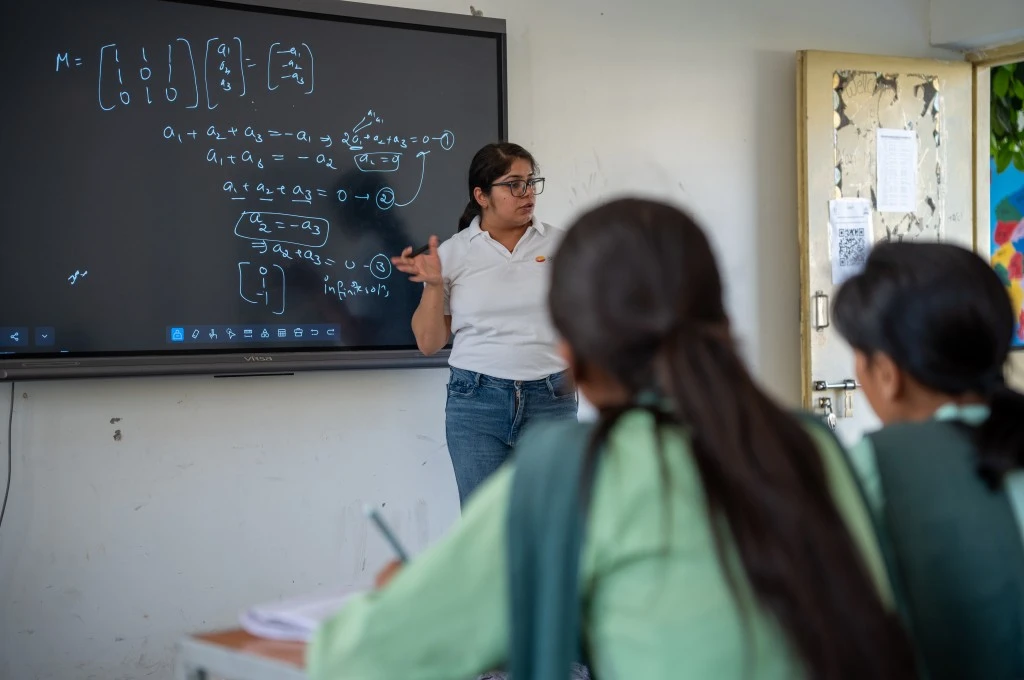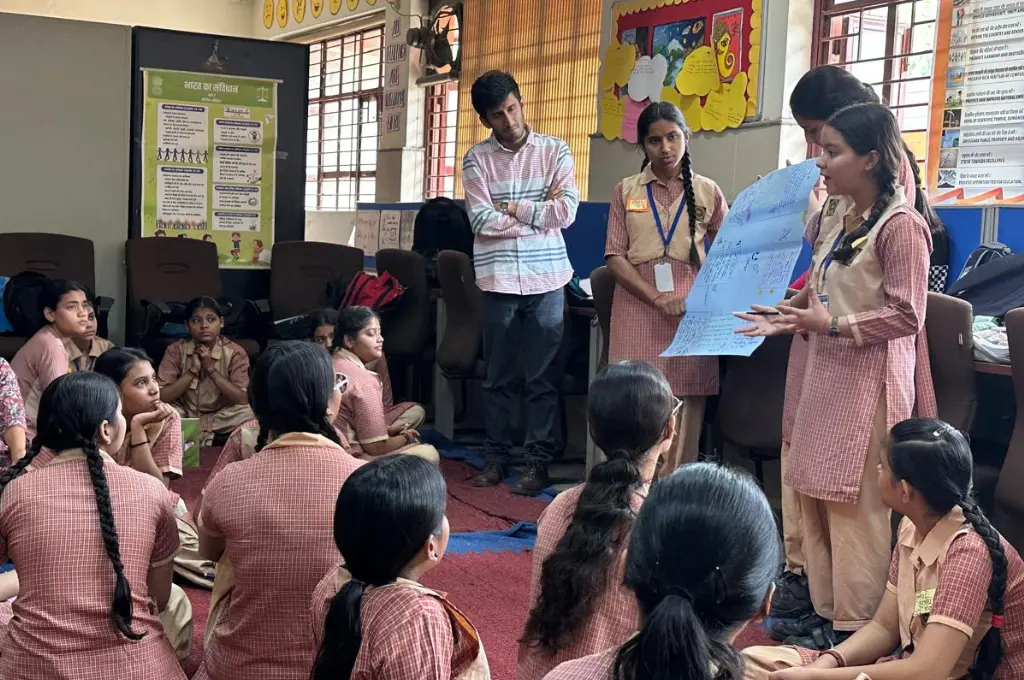In 2018, I joined the India Fellow Social Leadership Programme, a 13-month long social change fellowship for youth who want to work in the development sector. As part of this, I was placed in an organisation which runs a school in rural Uttar Pradesh. My parents had been opposed to me joining the fellowship as they thought the best path was to get a sarkari naukri (government job) because of the financial security it provides. It took a great deal of time and energy to convince them to let me join the fellowship. When they finally agreed, it was on the condition that if I was going down an unknown path, I should have some significant results to show for it. Since then, the one thing I had on my mind was that I would prove myself. So, when I started at the school where I was placed, I came in with the idea that I was supposed to ‘bring change’—but without a clear idea of what to change and how.
And so, my journey as a fellow began. I was assigned to teach sixth to eighth-grade students, and in the first two weeks itself I started to observe that the children in the school were not doing well. Their grades were low and they were far behind the expected learning outcomes for their age.
I noted down my observations. Of the many I had, one significant observation was that the children did not form a strong relationship with the teachers. They did not ask the teachers any questions, nor did they respond when asked questions by the teachers. I also noted that there were several teachers for each class and therefore it seemed like no single teacher was responsible for the performance of their students.

To address these issues, I sent a proposal for a ‘One Class One Teacher’ project to my mentor at the organisation where I was placed. The idea behind the project was to assign one teacher to one classroom, who would teach all the subjects. In doing this, I believed that the concerned teacher would take ownership of their class, thereby improving the learning levels of the students. My mentor gave me the go-ahead and agreed to run this project as a pilot to see its effectiveness. As part of the pilot, my mentor and I decided that I would teach one of the classes, and it would be my responsibility to improve the learning levels of students in that class.
Initially, the students were excited because everything was new and interesting.
I started the project feeling positive and with the idea that ‘I will bring change’. We started with Grade 6—the lowest-performing grade in the school. From seating arrangements to teaching strategy, I changed everything in the class. I wanted to start working on the foundational skills of the students, so I started teaching basics like alphabets, numbers, place values, and grammar. Initially, the students were excited because everything was new and interesting; they were eager to learn everything I asked them to.
After one month of the programme, the school administrators paid a visit to my classroom. They were not pleased with the idea that I was teaching Grade 6 students the curriculum of second graders. And so, they also asked me to show improvements in the mid-semester examination which was a month away.

Being confident that the changes I had made would be effective, I did not say anything to them. I accepted the challenge. However, with the looming deadline, I shifted the pressure onto my students and expected them to perform better regardless of where they were on the learning curve. I started giving them more homework, asking them to attend extra classes, and much more. Almost immediately, I saw the students get less interested in learning. They also started rote learning again, which they saw as the quickest way to pass exams.
From having bulletproof self-esteem, I was shattered because I could not show the results I had promised.
When the results came in, only 10 out of the 60 students in Grade 6 had cleared their exams in all subjects—a clear indicator of my failure. Naturally, I couldn’t convince the school administration to continue the project, and ‘One Class One Teacher’ was shut forever. My ideas clearly did not match with what the school wanted. From having bulletproof self-esteem, I was shattered because I could not show the results I had promised. I started doubting my ability to bring about change.

I sat down with my mentor to reflect and understand what went wrong, and when. I realised that it was right in front of my eyes and yet something that I had totally missed. In my plan to change the system, I had not involved the major stakeholders—the teachers. I had internalised the idea that I knew better than others (especially in this case, because my father is a teacher). Since I had been observing his way of teaching, classroom arrangement, and school leadership from a young age, I thought I had a fair idea of how things work in classrooms—without ever having been a teacher myself. And so, when implementing a completely new system in a school, I failed to talk to the people who knew more about the school and the children than anybody else.
After some reflection, I noted a few things that I could have done differently with the whole project:
- When I started designing the project, I included and addressed issues that I had observed. I never asked the other teachers about the problems they faced in the classroom. Also, I never asked the students if they were comfortable being taught by only one teacher. I was so engrossed with the original idea, that I did not take the time to think about the probable issues. I learnt that the needs and interests of the stakeholders are very important aspects to consider in designing any project. Without fully understanding what was expected of a project—in this case, the outcomes that the school authority wanted me to show—a good idea may not only go nowhere, but actually worsen the situation.
- I was also under the impression that changing teachers, teaching-learning materials, or teaching methods were the only ways to improve the learning outcomes of the students. I overlooked many other important factors, such as the involvement of the community, for example. Many students who were part of the project were from marginalised communities. Their parents practised agriculture and were often busy in the fields, and so they didn’t have time to focus on their children’s studies. Children also had to go to the field after school to help their parents, and thus, they had very less time to practise the lessons taught in the classroom.
- Change is not possible in a very short span of time. In a month (or any specified period of time), it is unrealistic to expect the students to learn everything. Change does not happen overnight, especially when you are working in the development space. There are many factors that affect educational outcomes—teachers, parents, teaching materials, classroom arrangement, peers. Improving educational outcomes is much more complicated than simply changing teachers, and requires work on each of these factors.
- There was a huge communication gap between me and the school authorities. I was able to convince the authorities about what I wanted to do but was unable to communicate why I wanted to do this and why this was important. Even if the project was meant to fail because it was not designed well, I would have had a little more room to experiment had the outcome of the project not been dependent on the exams conducted by the school.
For the rest of the fellowship year, I decided to help rather than change. After speaking with the teachers, I made a list of things I could support them on. Over the next few months we held a number of workshops for children, teachers, and parents as well. We used these to understand the areas of interest among the children and then started implementing different types of teaching methodologies in classroom to make learning interesting and fun.
I joined the fellowship with the idea of ‘me’ changing the world, but now I have strike out ‘me’ and believe in ‘we’. I have become more empathetic, but my biggest takeaway has been that in order to learn, you first need to unlearn your biases.
This article was published with India Fellow Social Leadership Programme, a strategic partner in Failure Files, a special series on IDR where social change leaders chronicle their failures and lessons learnt.




